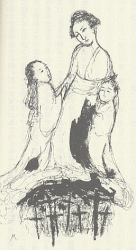
While Shogun Hidetada was in Fushimi Castle preparing to return to Edo (modern Tokyo)
after finishing his work in Kyoto, Itakura tried to act as a mediator for
the Christians, but his efforts brought about the opposite result by bringing
the death penalty down on them.
When Hidetada heard that there were still Christians in Kyoto in spite
of his command, he sentenced death to Christians who were still in the
prison as well as those whom Itakura had set free as a lesson to everyone.
Hidetada himself pronounced a sentence of death by burning for all the
Christians including women and children.
With this command, those who had been released once were sent back to the
prison again.
Although Tekura Hashimoto knew that she was going to be killed, she returned
to the prison with her five children.
It is natural for any parent to wish onefs children to survive
I myself became pregnant for the first time in January this year and when
I was told by the doctor in the seventh week of the pregnancy that there
was a strong likelihood that the baby would miscarry, I started to stroke
my belly and talk to the baby, saying, "You will be born healthy.
You don't have to worry."
And the thought came to me many times that if I could die, instead of my
baby I would gladly take his/her place..
.Above all else I wanted my baby to survive and live even if I die.
However, Tekra Hashimoto was different. It was almost as though she were
glad to be condemned to death with her five children because they were
Christians.
Tekra Hashimoto knew that death itself was not something sad. She knew
that it was wonderful to die a martyr and be called in heaven.
Being a woman like Tekura I was deeply moved by the beauty and strength
of the woman who trusted the savior, Jesus Christ, and by her love toward
her children as a Christian mother.
The faith of Tekra was inherited to her children. All of them returned
to the prison with their mother.
There was no weeping and wailing in the prison at the command of Shogun.
Filled with joy, everyone prepared for their last moments.
In a certain book, it is written, "The inside of the prison became
like a church."
@@@But at midnight Paul and Silas were praying and singing hymns
to God, and the prisoners were listening to them.(Acts 16:25)
This was what happened in Japan 400 years ago.
